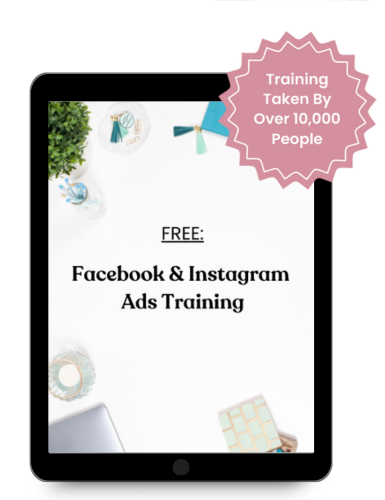What if I told you that the reason your Facebook ads aren't profitable has absolutely nothing to do with your ads themselves?
It's not your targeting that's off. Your creative isn't the problem. Your budget isn't too small or too large. The real culprit is lurking in the shadows of your marketing funnel—it's what happens after the click that's sabotaging your success.
Here's the uncomfortable truth: Most course creators and online entrepreneurs are flying blind with their Facebook ad spend. They're pouring money into campaigns without any real way to track whether that investment ever comes back as actual revenue. It's like being a detective trying to solve a case with no fingerprints, no witnesses, and no evidence trail.
But what if you could follow every single ad dollar from the moment it leaves your Facebook account to the day it returns as cold, hard cash in your bank account? What if you never had to wonder again whether your ads “worked” or just hope that somehow, magically, they contributed to your bottom line?This comprehensive guide will transform you into an Ad Dollar Detective—someone who can track, analyze, and optimize every aspect of their Facebook ad funnel with surgical precision. No more gambling with your ad budget. No more crossing your fingers and hoping for the best. Just clear, trackable returns that let you scale with confidence.
Estimated reading time: 14 minutes
💡 Want the full picture? This article goes hand-in-hand with Episode 312: From Ad to $ in the Bank: Funnels Demystified of The Launch Lounge Podcast.
Pop in your earbuds and get the deeper dive.
👉 [Listen to the companion episode here]
Why Most Facebook Ad Tracking Systems Fail (And How to Fix Yours)
Before we dive into the solution, let's talk about why most Facebook ad tracking falls short for course creators. Your Meta Ads Manager is great at telling you about clicks, impressions, and even (some) conversions. But here's what it can't tell you:
- Which lead magnet actually converts to sales three months later
- Whether your organic efforts or paid ads bring in higher-value customers
- What the complete customer journey looks like from first click to final purchase
- Which campaigns generate leads that become your best long-term clients
This is where CRM tagging systems become your secret weapon. Think of your CRM as your detective's notebook, and each tag as a crucial piece of evidence. Without proper tagging, you're essentially trying to solve the mystery of your marketing ROI with no clues.
Part 1: The Detective's Foundation – Essential CRM Tagging for Ad Attribution
The Two-Tag System That Changes Everything
Forget complicated tracking software and expensive attribution tools. You need just two smart tag categories to unlock the mystery of your ad performance:
Tag Category 1: SOURCE (Energy vs. Money)
This tracks whether you invested energy or money to acquire each lead:
- SOURCE: PAID – All leads from Facebook/Instagram ads
- SOURCE: ORGANIC – All leads from social media, SEO, word-of-mouth, partnerships
Why This Matters: Six months from now when you're analyzing your launch results, you'll know exactly how many buyers came from your ad dollars versus your organic efforts. This single insight will guide every future marketing decision you make.
Tag Category 2: CAMPAIGN (What They Opted In For)
This tracks exactly what offer or content attracted each lead:
- LEAD: [Lead Magnet Name] – e.g., “LEAD: 5 Day Video Training”
- LEAD: [Webinar Name] – e.g., “LEAD: A-Lister Webinar”
- LEAD: [Application] – e.g., “LEAD: Agency Application”
Pro Detective Tip: Always add dates to recurring campaigns. Instead of just “LEAD: Webinar,” use “LEAD: Webinar Oct24.” This lets you track performance trends over time and identify seasonal patterns in your conversion data.
Setting Up Your CRM Tags Across Different Platforms
For Kajabi Users:
- Navigate to People → Tags → Create New Tag
- Create your SOURCE tags: “SOURCE: PAID” and “SOURCE: ORGANIC”
- Create LEAD tags for each opt-in: “LEAD: [Name]”
- Add tags to your forms under Settings → Form Fields
For ActiveCampaign Users:
- Go to Contacts → Tags → Add Tag
- Create automation sequences to apply tags when forms are submitted
- Use conditional logic: If form = “webinar-ads” then add “SOURCE: PAID”
- Set up multiple tag applications for comprehensive tracking
For Kit (ConvertKit) Users:
- Navigate to Subscribers → Tags → New Tag
- Add tags to forms under Forms → [Form Name] → Settings
- Set up Rules to automatically apply multiple tags based on form submission
Critical Success Factor: Set up your tags BEFORE you start running ads. Retroactive tagging is messy, inaccurate, and will compromise your data integrity from day one.
Part 2: The Tracking Infrastructure – Creating Separate Landing Pages for Accurate Attribution
The Golden Rule of Ad Attribution
Every Facebook ad project must have its own dedicated landing page, thank you page, and form. This isn't optional—it's the foundation of accurate tracking.
For List Building Projects:
- Organic Page: yoursite.com/free-guide (tags: SOURCE: ORGANIC + LEAD: Free Guide)
- Paid Page: yoursite.com/free-guide-ads (tags: SOURCE: PAID + LEAD: Free Guide)
For Launch Projects:
- Organic Webinar: yoursite.com/webinar (tags: SOURCE: ORGANIC + LEAD: Webinar Oct24)
- Paid Webinar: yoursite.com/webinar-ads (tags: SOURCE: PAID + LEAD: Webinar Oct24)
Why Separate Pages Are Non-Negotiable
This separation is the only way to accurately compare the ROI of your energy versus your money. You'll discover patterns like:
- Organic leads convert at 15% but paid leads convert at 8%
- Paid leads have a higher average order value despite lower conversion rates
- Certain lead magnets perform dramatically better with paid traffic
- Your organic audience engages differently with your content than paid traffic
Without separate tracking, these insights remain hidden, and you'll continue making marketing decisions based on incomplete data.
Part 3: The Revenue Detective Report – Analyzing Your Customer Journey Data
Post-Launch Analysis That Reveals Everything
After your launch concludes, export your buyer list with all attached tags. Upload this data to ChatGPT or Claude AI and become a data detective with these essential questions:
Revenue Source Analysis:
- “What percentage of buyers had the tag ‘SOURCE: PAID' vs ‘SOURCE: ORGANIC'?”
- “What's the average order value difference between paid and organic buyers?”
- “Which source has better long-term customer retention?”
Lead Magnet Performance:
- “Which lead magnet tag appears most frequently among buyers?”
- “What's the conversion rate from lead to buyer for each lead magnet?”
- “Are there lead magnets that attract leads but don't convert to sales?”
Customer Journey Mapping:
- “How many buyers signed up for the webinar vs. bought without attending?”
- “What's the most common sequence of tags among high-value buyers?”
- “How long is the typical journey from first opt-in to purchase?”
Sample AI Analysis Prompt
I'm attaching my buyer data with CRM tags from my recent launch. Please analyze and provide insights on:
1. What percentage of buyers came from paid vs organic sources?
2. Which lead magnet had the highest buyer conversion rate?
3. What's the most common customer journey pattern among buyers?
4. Are there any surprising trends or patterns I should investigate?
5. Which traffic source generated higher lifetime value customers?
Please present the data in a clear, actionable format with specific recommendations for my next campaign.
Part 4: The Profit Path Decision Tree – What Your Data Reveals About Scaling
Making Smart Scaling Decisions Based on Real Data
Your tracking data will reveal one of several scenarios. Here's how to respond to each:
Scenario 1: 80%+ of buyers came from ORGANIC sources
❌ Don't scale ads yet
✅ Focus on: More content creation, SEO optimization, partnerships
✅ Run: List building ads only (not direct sales ads)
✅ Strategy: Build your organic reach first, then layer in paid promotion
Scenario 2: 30%+ of buyers came from PAID sources
✅ Ready to scale paid advertising
✅ Focus on: Increase ad spend on winning lead magnets and webinar ads
✅ Strategy: Double down on what's working while testing new angles
Scenario 3: One lead magnet dominated buyer tags
✅ Allocate 70% of ad budget to this winning lead magnet
✅ Test: Create similar lead magnets that appeal to the same audience
✅ Strategy: Become the go-to expert for this specific topic/solution
Scenario 4: 90% of buyers attended your webinar
✅ Webinar is essential—prioritize webinar registration ads
✅ Test: Different webinar titles, formats, and presentation styles
✅ Strategy: Perfect your webinar funnel before expanding to other formats
These are four potential scenarios out of thousands of possible scenarios.
Advanced Attribution Insights
Look for these advanced patterns in your data:
The “Slow Burn” Pattern: Leads that take 12+ months to convert but become your highest-value customers
The “Quick Convert” Pattern: Leads that buy without attending your webinar may have higher refund rates
The “Webinar Dependent” Pattern: Customers who only buy after attending live presentations
The “Content Consumer” Pattern: Buyers who engage with multiple lead magnets before purchasing
Each pattern suggests different optimization strategies for your Facebook ad campaigns and overall marketing funnel.
Part 5: Advanced Tracking Strategies for Serious Ad Dollar Detectives
Beyond Basic Tagging: Next-Level Attribution
Lifetime Value Tracking:
Tag customers based on their total purchase value:
- CUSTOMER: LOW ($0-$500)
- CUSTOMER: MID ($501-$2000)
- CUSTOMER: HIGH ($2001+)
Engagement Level Tracking:
Monitor how engaged leads are before they buy:
- ENGAGEMENT: HIGH (opens 80%+ of emails)
- ENGAGEMENT: MID (opens 40-79% of emails)
- ENGAGEMENT: LOW (opens <40% of emails)
Timeline Tracking:
Track how long the sales cycle takes:
- TIMELINE: FAST (0-7 days)
- TIMELINE: NORMAL (30-90 days)
- TIMELINE: SLOW (91+ days)
Facebook Pixel Integration with CRM Tagging
While your CRM tags provide the detailed customer journey, don't neglect your Facebook Pixel setup. Use Facebook's Conversions API to send your CRM data back to Facebook, creating a feedback loop that improves your ad targeting over time.
Part 6: Troubleshooting Common Tracking Problems
When Your Data Doesn't Make Sense
Problem: Facebook reports 100 conversions, but your CRM only shows 75 new leads. A discrepancy in the reported number of leads between Facebook and your CRM is to be expected. Facebook will usually underreport conversions.
Solution: Check for duplicate entries, form abandonment, and email deliverability issues.
Problem: Your organic traffic seems to convert better than paid traffic.
Investigation: Are you comparing apples to apples? Organic traffic might be more qualified because they found you through search, socials or referrals. Consider the full customer journey, not just conversion rates.
Problem: Certain lead magnets show high opt-in rates but zero sales.
Analysis: These might be attracting the wrong audience or setting incorrect expectations. Review the messaging alignment between your ad, landing page, and lead magnet. Remember, on average, about 5% of the leads in your launch will convert to sales.
Data Quality Assurance
Weekly Data Hygiene:
- Check for untagged contacts
- Verify form submissions are triggering correct tags
- Monitor for duplicate or conflicting tags or automations
- Review automation sequences for proper tag application
Annual Deep Dive:
- Analyze tag distribution across your list
- Identify patterns in high-value customer tags
- Review and update tag naming conventions
- Clean up outdated or unused tags
The Real Talk Wrap-Up: From Guesswork to Growth
You don't need to be a data scientist to track your ad dollars effectively. You just need to be a detective—curious, methodical, and willing to follow the evidence wherever it leads.
The system I've outlined isn't complicated, but it is comprehensive. It's the difference between hoping your ads work and knowing exactly how they work. It's the difference between scaling based on gut feelings and scaling based on hard data.
Your Action Plan:
- This Week: Set up your two-tag system in your CRM
- Next Week: Create separate landing pages for paid and organic traffic
- Before Your Next Campaign: Implement the complete tracking infrastructure
- After Your Next Launch: Run the revenue detective analysis
- Moving Forward: Make data-driven scaling decisions with confidence
Remember: Every successful online business is built on a foundation of knowing your numbers. Your Facebook ads should fund your freedom, not your frustration. With this tracking system in place, you'll never again wonder whether your marketing investments are paying off—you'll know exactly where every dollar goes and when it's coming back.
The mystery of your marketing ROI is about to be solved. Time to put on your detective hat and start following the money.
Frequently Asked Questions About Facebook Ad Tracking and CRM Tagging
Q: Do I really need separate landing pages for paid and organic traffic? Can't I just use UTM parameters?
A: While UTM parameters can track traffic sources in Google Analytics, they don't integrate with your CRM's tagging system for long-term customer journey tracking. Separate landing pages ensure that every lead is properly tagged in your CRM from the moment they opt-in, giving you complete visibility into which traffic sources convert to actual sales months later. UTM parameters disappear once someone becomes a lead—CRM tags follow them through their entire customer journey.
Q: What if I'm already running ads without this tracking system? Can I implement it retroactively?
A: You can start implementing this system immediately for all new campaigns, but retroactive tagging is messy and often inaccurate. For existing campaigns, create new landing pages with proper tagging and gradually redirect your ad traffic. Don't try to guess or manually tag existing leads—focus on getting clean data moving forward. Your future self will thank you for starting with accurate tracking now rather than trying to fix incomplete historical data.
Q: Which CRM platform works best with this tagging system?
A: This system works with any CRM that supports custom tags and form automation. The most popular platforms among course creators are:
- Kajabi: Built-in integration with landing pages and email marketing
- ActiveCampaign: Powerful automation and conditional tagging
- Kit (ConvertKit): Simple setup with excellent deliverability
- HubSpot: Advanced reporting and attribution features
Choose based on your current tech stack and budget—the tagging principles remain the same across all platforms.
Q: How long should I wait before analyzing my tracking data?
A: For list-building campaigns, you can analyze lead quality within 2-4 weeks. For sales conversion analysis, wait at least 90 days after your campaign ends. Many customers take 30-90 days to make purchasing decisions, especially for higher-ticket courses and programs. Analyzing too early will give you incomplete data and lead to poor scaling decisions.
Q: What if my Facebook Pixel shows different conversion numbers than my CRM tags?
A: This is completely normal and expected. Facebook Pixel tracks actions (clicks, page views, form submissions) while your CRM tracks actual people who completed your opt-in process. Discrepancies occur due to:
- People who start but don't complete forms
- Email deliverability issues
- Privacy settings blocking pixel tracking
- Multiple devices/browsers
Focus on your CRM data for business decisions—it represents real leads you can actually market to.
Q: Should I tag leads differently based on their engagement level?
A: Start with the basic SOURCE and CAMPAIGN tags first. Once you have 3-6 months of data, you can add engagement-based tags like:
- ENGAGEMENT: HIGH (opens 80%+ emails)
- ENGAGEMENT: MID (opens 40-79% emails)
- ENGAGEMENT: LOW (opens <40% emails)
But don't overcomplicate your system initially—focus on tracking source and campaign performance first.
Q: How do I handle leads who come through multiple channels before converting?
A: Your tagging system should capture the first touchpoint, not the last. If someone finds you organically, joins your list, then later clicks a Facebook ad and downloads another lead magnet, they should keep their original “SOURCE: ORGANIC” tag. This gives you accurate attribution for what initially brought them into your ecosystem. You can add additional tags for subsequent interactions, but preserve the original source data.
Q: What's the minimum ad spend needed to get meaningful tracking data?
A: You need at least 50-100 conversions per campaign to draw reliable conclusions. For most course creators, this means:
- List building ads: $500-$1,500 depending on your cost per lead
- Webinar registration ads: $1,000-$3,000 depending on your niche
- Direct sales campaigns: $2,000-$5,000 for statistical significance
Don't make scaling decisions based on small sample sizes—wait until you have enough data to identify real patterns.
Q: Can I use this system if I'm running ads to multiple offers simultaneously?
A: Absolutely! This system is designed for multiple campaigns. Just ensure each offer has:
- Its own dedicated landing page
- Unique campaign tags (e.g., “LEAD: Webinar Oct24” vs “LEAD: PDF Guide Oct24”)
- Separate tracking in your analysis
The key is maintaining consistent naming conventions so you can easily compare performance across different offers and time periods.
Q: What if I don't have a big enough email list to segment my analysis?
A: You can implement this tracking system regardless of list size, but you'll need patience for meaningful analysis. With smaller lists:
- Focus on lead quality metrics first (engagement rates, email opens)
- Wait longer between campaigns to build sufficient data
- Consider running longer campaigns to gather more conversion data
- Start with one primary lead magnet to concentrate your data
Even with 500-1,000 subscribers, this tracking system will give you valuable insights for future growth.
Q: Should I delete or clean up old, untagged contacts in my CRM?
A: Don't delete them, but do segment them separately. Create a tag called “LEGACY: Pre-Tracking” for all contacts without proper source attribution. This preserves your historical data while keeping your new, properly-tagged contacts separate for accurate analysis. You can still market to legacy contacts—just don't include them in your ROI calculations for new campaigns.
Want more actionable marketing strategies? Tune into our podcast for weekly insights on scaling your online course business with Facebook and Instagram ads that work. Listen on Apple – Spotify – YouTube









